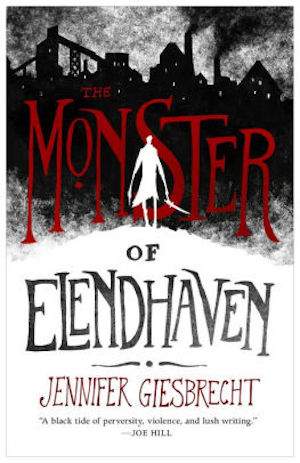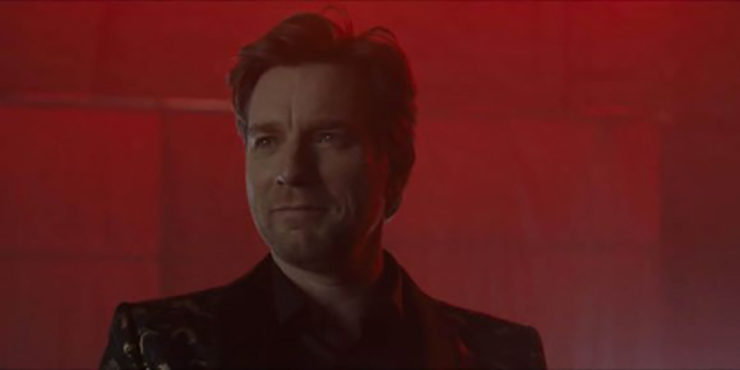When the news broke that Warner Bros’ upcoming Birds of Prey film would feature a male villain who would have “palpable sexual tension” with another male villain, Victor Zsasz, eyebrows were raised—especially considering the rumors that his character arc will include the release of racy photographs. It is true that fans have been hoping to see a queer character in the DCEU, not to mention within the oeuvre of superhero media. But is this what fans are asking for? Another queer villain? Another queer male villain? Another queer male villain who is played by a straight actor? (This time, Ewan McGregor.) The fans sighed; the tweets flew fast and furious. It’s not that there can’t be queer people who are bad, we argued. But we are a sick of them only getting to be bad. Aren’t we?
Vito Russo wrote in 1981’s The Celluloid Closet: “Nobody likes a sissy…there is something about a man who acts like a woman that people find fundamentally distasteful.” The easiest way to make a villain is simple recipe: One-part delicate mannerisms plus one-part exaggerated dialogue, with a dash of a sashay for good measure, et voilà! You’ve created Hades from Disney’s Hercules!
It doesn’t require a degree in gender and sexuality to understand why this trope is problematic. Just for fun though, let’s just check in with some scholars on the topic. Meredith Li-Vollmer and Mark E. LaPointe, in their 2003 study “Gender Transgression and Villainy in Animated Film” drew this incisive conclusion after researching the presentation of villains in classic children’s films: “The equation of villainy with the feminine and queer reinforces hierarchies of traditionally male qualities over female, heterosexual over homosexual.” It isn’t just that the women and coded queers in those films belong in a subservient position to the men, but their defining characteristics make them inherently deviant. Scar snidely tells Mufasa he will practice his curtsey, not his bow. Jafar glides through the Sultan’s palace, with refined manners in direct contrast to Aladdin’s manful swagger.
A path to absolution for these characters doesn’t exist—because of their deviance they must be exterminated. While Li-Vollmer and LaPointe concentrate their scholarship on animated films for children, this trope is prevalent in adult films as well, from Silence of the Lambs’ Buffalo Bill’s desire for a woman suit (get it??) or the predatory Mrs. Danvers in Rebecca, who is obsessed to a terrifying and obviously queer degree with her former mistress. In the Marvel universe, Loki the comic book character is canonically pansexual and has the ability to switch his biological sex. That ability doesn’t make him genderfluid per se (more on that here), but it does add a definite queer bend to his character. Also, he is a literal god of chaos and is from an entirely different planet! The idea that he would adhere to any binary is laughable. Tom Hiddleston’s Loki has never had any onscreen dalliances, but his sneering disdain and that antler rimmed helmet? Huge queen. Of course, he is thoroughly trounced on the gay-o-meter by Hela, played by Cate Blanchett, catnip for queers the world over. She literally changes her hair before fighting, a move designed to make the hearts of dramatic theater queers go pitter patter.
On the small screen, the queer villain is often combined with another problematic trope—queer baiting. In this potent combination, the villain is not only flagged as queer, but also spends a long, long time building up tension and chemistry with another character, only for audiences hopes to be dashed again and again as a husband makes his way back into the picture or a long-suffering girlfriend appears. The aptly named “Villanelle” on the BBCs Killing Eve is bisexual, and her relationship with Sandra Oh’s titular Eve is so textually queer that it is all the more frustrating that Oh is on record both denying the queerness of the relationship, saying to Gay Times “you want to make it into something… but it just isn’t,” while simultaneously saying “[the]…discovery of the wider reaches of sexuality is the theme of the show.” Not only is this insulting to viewers—the relationship is gay as hell, it just is!—it has the added bonus of making us feel like our lives aren’t worth seeing on screen. A similar complaint was leveled at the 2014 Hannibal, audiences widely read the relationship between Mads Mikkelsen’s Hannibal and Hugh Dancy’s Will Graham as a gay one. While Fuller maintained that Will was straight, Hannibal, he said, “probably is capable and interested in everything humanity has to offer.” Where Sandra Oh is at least willing to concede that there is an element of sexual exploration for both characters, Fuller makes it clear. The good one is straight. The one who eats people? He’d fuck anything.
Buy the Book


The Monster of Elendhaven
And yet. Let us pause for a moment and consider what happens when the queerness of these characters is wiped away. The Lion King was just remade and released with a ton of press and fanfare, but the reviews are middling at best. Aside from the fact that a “live action” film about lions ends up looking like a scene that David Attenborough cut from Planet Earth because it was too boring, another complaint has made its way to the surface. Not only are viewers asking why we needed this remake when the animated film is still a classic and the Broadway show has been running since 1999, but also—why on earth is Scar so… straight? What is the point of “Be Prepared” delivered without, as NPR’s Glen Wheldon put it, the “luxuriously fey” performance of Jeremy Irons? Disney’s remake of Aladdin released earlier this year was also widely regarded as critical failure. The film suffered for many reasons, but it probably didn’t help that noted drama queen Jafar was simply “Hot Jafar.” The formerly biting and bitchy advisor was… hot, and honestly, not much else. Unsurprisingly, he was not a hit. Up next on the list of remakes is The Little Mermaid, and while I’m pumped to see a black Ariel, Melissa McCarthy’s casting announcement left a lot of folks wanting more. McCarthy is a once in a generation comedic talent, but can she really imbue Ursula with the performative drag energy that is required for that character to be interesting and fun and scary? If we are sick of seeing queer villains, and recognize the harm they do, then what does it mean that we’re also upset when recognizably queer villains are portrayed as straight?
The problem with a straight Scar isn’t his heterosexuality, it’s that once you take away that queerness, there isn’t anything left. His deviance is tied so closely to his over the top slinking through the savannah because that is what made him immoral. You can’t take that away without putting in real character development, it just doesn’t work. The problem was never that the villains were gay, it was a problem because that’s all they were. When a character’s perceived sexuality does the work of informing the entirety of their character, taking that away leaves you with a boring lion with a jacked-up mane and a hot guy who looks like he’d tell you he was “working on” breaking up with his boyfriend. Here, at least, some of our newer queer villains mark some kind of progress. While Villanelle’s bisexuality complicates her, it is not the reason for her evil. Without it, the show would probably be less compelling, but she’d still be a believable villain. If Hela no longer dramatically changed her hair for a battle, she’d still be the Daughter of Darkness, cast out by her father because he was ashamed of her. (Though… that is still quite gay.) Hannibal, whether he wants everything humanity wants to offer or not, still eats people.
It is not surprising that we took these villains and fashioned them into icons, given the lack of visible gay characters in media. If Scar left you cold, perhaps the fact that Maleficent cursed a child to death because she didn’t get invited to a party spoke to you. Or maybe it was Ursula’s condemnation of men, or Jafar’s drawling sarcasm. A generation of us learned to take the scraps that were tossed to us and fashion them into something that hurt less. A way of claiming space in a world that told us we were inherently wrong, deviant and broken.
We’ll be okay without the queer villains, in the end. It’s probably better in the long run to start taking away the fey and dramatic bad guys from children’s media. And look, this Birds of Prey situation doesn’t have to be terrible either! Just as long as the villainy can be separated from his supposed queerness, then have at it. But honestly, would it kill ya to throw us a good guy? Sometime?
Christina Tucker is one half of the Unfriendly Black Hotties, a podcast about the intersection of race, gender, and sexuality in higher education, pop culture, and politics. Christina is also a rotating fourth chair on NPR’s Pop Culture Happy Hour, as well as the Social Media Manager for the Food 4 Thot podcast. Twitter: @C_GraceT.










